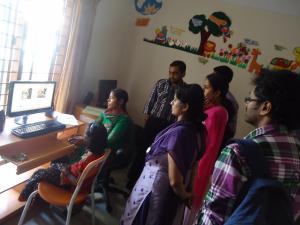
Insight is a FLOSS-based ICT centre for the differently abled in Trivandrum, Kerala, India. In seven years, the programme has trained more than 1,000 people with visual disabilities in ICTs and has created a team of 25 visually challenged master trainers. Insight has also made significant strides in disability empowerment through seminars, workshops, awareness campaigns and the establishment of ICT centres for adults and children with physical and cognitive disabilities. Insight began as a community-based pilot programme and is now integrated into the state of Kerala’s social development agenda.
In 2009, SPACE went beyond programmes for the visually impaired as they reached out to children with cognitive and motor disabilities by developing tools and support mechanisms for individual students and their families.
APC interviewed Arun Madhavan, executive director of SPACE, about the Insight initiative, what the organisation’s future plans and his advice to activists inspired by their initiative.
APCNews: How did you first come across FLOSS and what it means to you?
Arun Madhavan: The tagline of our organisation is ‘Where free software is way of life’. We started from free software. We are driven by the ideals of free software which is around sharing and community. We think that we don’t stand in isolation from other social struggles. We tried to use our tools and politics to link with other movements and try to build a better world.
APCNews: What do you value most about your initiative?
AM: No one person, including leaders of free software movement in India, thought that focusing on the issue of disability was a priority. But through our efforts we created new partnerships. The work we started was taken up by the stakeholder community. The community really owned it, making it theirs.
As an organisation we are quite proud when our work is taken on by the community, whether it is free software in education like our IT@School initiative, in government and public sectors such as the power company or in disability access.
APCNews: What are future plans for your initiative? What should we look out for?
AM: In the case of disability our aim is to get our work integrated into the education system of the state of Kerala. This will help the tools and techniques to be replicated across the region, reaching many more people. We also want to work on some issues of tribal communities in the state with free software as a tool.
APCNews: Do you have any advice for other groups trying similar initiatives?
AM: When you enter uncharted waters, keep your senses open, respond to each situation creatively and learn in each and every moment. Let your ideals drive you. You may fail but failure is not such a bad thing. Just keep on trying.
APCNews: How do you think other members of APC should support FLOSS?
AM: We would be happy if APC could persuade other members and other organisations to try what we tried to do. Some issues like improving technology can not be done by us alone. Together we can do much more.
APCNews: What does recognition of the Chris Nicol prize mean to you?
AM: Prize or recognition were outside our scope when we started our work. We are more driven by politics and we just want to do it. Secondly we do think that what we did is quite unique. Not many had looked into the role of free software in the context of disability. We kind of brought two important issues together building new synergies. As far as we know it was first time such a step is taken at least in the developing world.
APCNews: Do you have any plans for the award money?
AM: When we look back we find that the best of our initiatives were accidental, in other words, not from planned programmes. It is not easy to get resources to experiment and create accidents. We plan to use the award to see if something new can be initiated. We are involved in some issues related to tribal communities and we need some resources there.
APCNews: Any recommendations for APC regarding future editions of FLOSS Prizes and regarding its FLOSS work in general?
AM: I believe the Chris Nicol FLOSS prize is an important initiative because while a lot is known about free software tools, much more needs to be done on the politics of free software. I stress political use, which is much more than simply using free software for some practical purpose. But while APC is supportive of free software, it does not have any programme focused on free software.
For example, “ICTs and disability” is an emerging and important issue. Our experience tells us that free software has a significant role to play. But this issue has not gained prominence in global policy discussion. An influential network like APC can do quite a lot here. An active intervention among the APC member community to promote free software adoption that leads with politics will be beneficial for both its members and the free software movement.
More info on SPACE:
- SPACE’s website
- For us, free software is not just about software
- Chris Nicol FLOSS Prize winners announced
Image by SPACE Kerala .